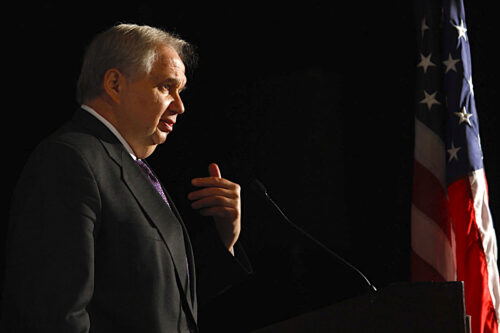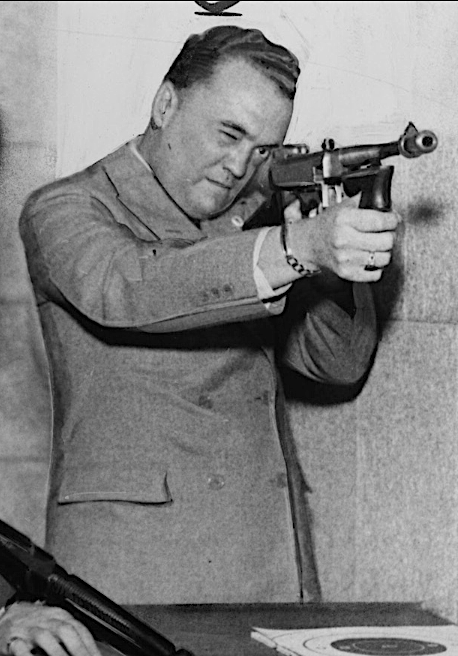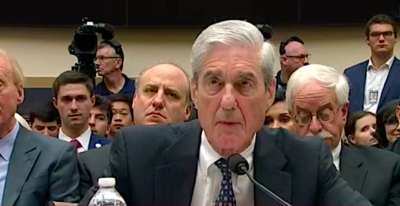Ghost of J. Edgar Haunts Flynn Investigation
Former FBI special agent Coleen Rowley explains Bureau misdeeds in the Flynn case.
By Coleen RowleySpecial to Consortium News
 In this time of unprecedented political polarization, it’s disappointing but not surprising to see the Justice Department’s recent request to dismiss its prosecution of retired General Michael Flynn causing yet another media firestorm to swirl around Attorney General William Barr.
In this time of unprecedented political polarization, it’s disappointing but not surprising to see the Justice Department’s recent request to dismiss its prosecution of retired General Michael Flynn causing yet another media firestorm to swirl around Attorney General William Barr.
Obama Administration former officials, like the hyperventilating authors of this New York Times’ op-ed, “The Appalling Damage of Dropping the Michael Flynn Case,” go so far as to claim that dropping the case “embeds into official U.S. policy a shockingly extremist view of law enforcement as the enemy of the American people.”
In stark contrast, other former FBI agents, myself included, are appalled at Bureau and other “national security” officials’ numerous suspicious departures from standard FBI/Department of Justice policies that have finally been brought to light, marking this most bizarre investigation aimed at “get(ting) Flynn to lie.”
Flynn was asked to “a friendly chat” with the FBI on Jan. 24, 2017, for which he was told he would not need a lawyer present. The interview was part of the FBI’s Russiagate investigation, a purported scandal that has now all but totally collapsed.
The agents wanted to speak with him about his conversations with Sergey Kislyak, the then Russian ambassador to the U.S., while Flynn was on the Trump transition team as incoming national security advisor. Having already read the transcripts of those intercepted conversations there was nothing the agents could learn from Flynn.
According to FBI administrative notesreleased earlier this month, an official identified in the press as Bill Priestap, then assistant director of the FBI’s Counterintelligence Division, asked whether the only aim of the upcoming interview with Flynn was to get him to lie about his conversations with Kislyak. “Our goal is to determine if Mike Flynn is going to tell the truth about his relationship with Russians,” said Priestap in a hand-written note. But Priestap was having second thoughts.
“I agreed yesterday that we shouldn’t show Flynn [REDACTED] if he didn’t admit,” he wrote, the redaction presumably meaning the transcript of Flynn’s calls with Kislyak. “I thought about it last night, and I believe we should rethink this. What is our goal? Truth/admission or to get him to lie, so we can prosecute him or get him fired?…Protect our institution by not playing games.”
Flynn was indeed formally charged with lying to an FBI agent and on Dec. 1, 2017 pled guilty after Russiagate Special Counsel Robert Mueller reportedly threatened to prosecute his son. Flynn was then fired by Donald Trump after Flynn lied to the vice president about the conversations with Kislyak.
In those conversations, Flynn asked that the Russians not retaliate for the Obama administration sanctions on Moscow imposed for the now debunked Russiagate allegations. Russia eventually decided not to retaliate. Flynn also asked on behalf of Israel that the Russians veto a UN Security Council resolution condemning illegal Israeli West Bank settlements, which Obama was planning to abstain on. Russia refused this request.
Upon release of the FBI documents this month, Flynn sought to undo his guilty plea and last week the Justice Department dropped the case. The judge, however, has not yet agreed and has asked for expert opinion.
Law Rarely Used
Many former FBI agents will probably recall being instructed in FBI training school (as I was) that Title 18 US Code 1001 (lying to an FBI agent) is not mainly to caution a suspect not to lie, but rather to get him or her to tell the truth to further an investigation.
We were taught (and later learned by experience) that, for a lot of reasons, violation of this provision of “lying to the FBI” would almost never be prosecuted, especially if it was the sole “crime” committed. One reason for this was, at least in my law enforcement experience, that many, if not most, people who are embarrassed to be suspected of wrongdoing, do lie, or at least partially fudge the truth during initial interviews, as it’s a natural ego-defense.
Please Donate to Consortium News’ 25th
Anniversary Spring Fund Drive
Anniversary Spring Fund Drive
So “getting” someone to lie, if that’s “the goal” (as admitted in the released FBI administrative notes on the Flynn case), is actually very easy. If the green light is now on to use T 18 USC 1001 law in this manner, the sky’s the limit. The FBI could lock up the world. In one of the released emails, FBI attorney Lisa Page shows how rare prosecution under 1001 is by writing:
“I have a question for you. Could the admonition re 1001 be given at the beginning of the interview? Or does it have to come following a statement which agents believe to be false? Does the policy speak to that? (I feel bad that I don’t know this but I don’t remember ever having to do this! Plus I’ve only charged it once in the context of lying to a probation officer.)”
‘Rewriting’ the 302
Fired FBI Agent Peter Strzok, a zealous Russiagater who took part in the Flynn interview, and (his paramour) Page, appear in the Flynn case to have run roughshod over basic FBI legal policy by heavily editing the notes of the interview, as aptly detailed by retired supervisory agent Thomas Baker and other FBI agents. While Strzok asked Flynn the questions, his partner at the interview, Agent Joe Pientka, took the notes, which Strzok and Page, who wasn’t present, edited, according to released text messages between them.
The rules drilled into new agents about the need to take verbatim notes, to be timely in documenting an interview on the FD-302 form for use in court, and to disallow edits by supervisors or attorneys who weren’t even present at an interview—policies all flouted in the Flynn case—were developed and designed to ensure accuracy during the Hoover era, long before tape recording equipment existed.
302s Only
Hoover’s FBI power was such that the Bureau could usually successfully insist, under federal rules of evidence and trial discovery, that only the final, polished FD-302 interview form would ever be handed over and made public at a trial.
The FBI and DOJ would always fight tooth and nail against “open file discovery,” claiming that other rough investigative and “administrative” documents in a file were not “relevant” and could therefore be kept hidden from the defense at trial.
It wasn’t until a few years after Hoover’s death that courts stopped FBI agents from destroying their contemporaneous interview notes and made the “1A envelope” preserved notes discoverable so that defense attorneys could check to see how closely the content of an agent’s FD-302 transcription conformed to his/her contemporaneous notes.
But the art of transcribing from rough notes in one’s own words what a suspect or defendant said does inherently allow even the most conscientious investigators some leeway, enabling the final 302 court document to be not as accurate as an actual recording of the interview.
In a conspiratorial “ends justify the means” situation that Strzok and Page believed themselves to be operating in, or in the case of any hell-bent, prosecution-focused, overzealous rogue agent(s), the old-fashioned FD-302 Hoover way is, and always was, susceptible to outright abuse.
(It may be appropriate to note that similar over-zealousness to benefit trial prosecutors was long practiced in the FBI laboratory until a top FBI agent-scientist and whistleblower blew the lid off related abuse that allowed FBI managers to rewrite and “strengthen” scientific results obtained by the agents who actually performed the forensic laboratory tests and analysis.)
Anyway, that’s why most other state and local law enforcement agencies in the country went (and/or were forced to go) to tape recording of confessions and other important interviews in the 1980’s to 1990’s. However the FBI bureaucracy long resisted the move to recording devices.
Over the decades, as voice and video recording equipment became more and more prevalent and easy to use, defense attorneys and even judges started to hammer FBI agents about why they continued their old-fashioned reliance on individual agents’ note-taking abilities and memories.
Nevertheless, for nearly 40 years FBI directors and special agents in charge (SACs) would continue arguing about the difficulty of using modern technology to record interrogations and interviews. They always contended (at least in internal arguments, but never publicly admitted on a witness stand) that allowing agents to testify and tell juries what a defendant said could always be relied upon as more successful for the prosecution than allowing a jury to hear a tape or video recording of exactly what a defendant said.
It was well known and even proudly pointed out internally that in “he said-she said” disputes, a jury would always tend to believe the FBI agent over a defendant.
The Flynn 302 fiasco illustrates how FBI managers recognized what an advantage the final “written in your own words” 302 is when it’s declared to be the only relevant document (no “administrative documents,” early drafts, etc. need ever be handed over in discovery) when juries will almost always believe the FBI agent over a defendant. It is rare for adminstrative documents to become public, as they have in the Flynn case.
Of course if Strzok and his fellow FBI agent had asked Flynn for his consent to be tape recorded, Flynn would have undoubtedly quickly realized this was not a friendly interview by agents attempting to actually gain counter-intelligence about Russia.
Not Material
That brings up a whole n’other problem with the Flynn case that again harkens back to Hoover and his pre-Church Committee abuses.
Barr and (former FBI agent, now U.S. Attorney) Jeffrey Jensen concluded, after reviewing the complete file, that Flynn’s “lying to the FBI” was not “material” to a bonafide matter under FBI jurisdiction, but merely predicated upon the entirely specious “Russiagate” counter-intelligence investigation of Flynn that Strzok and Page deliberately kept open on a technicality, even after the FBIordered it closed because there was no reasonable basis to believe Flynn had ever colluded with the Russian government.
The Flynn case furnishes a sterling example of the post 9-11 “war on terror” having demolished the “wall” that separates intelligence gathering from criminal investigation.
While fraught with problems and contradictory DOJ guidance, the “wall” had existed for a valid reason after Church Committee discovery of abuses under Hoover et. al. who so easily used “national security” and “counter-intelligence” as a pretext to surveil, investigate and use COINTELPRO “disrupt and dismantle” activities to go after America’s national leaders, allowing a way around 4th Amendment protections.
I and other former FBI agents believe the egregious plotting to railroad Flynn and “get him to lie,” requires dismissal of these charges. A number of additional significant problems with the Flynn investigation and prosecution are enumerated by attorney and award-winning journalist Glenn Greenwald in his excellent 1 ¾ hour-long detailed expose at The Intercept and by Scott Ritter, who focuses on “why innocent people plead guilty given plea bargaining” abuses in our justice “system.” Neither Greenwald, Ritter nor I happen to be fans of Flynn or Trump. But wrong is wrong.
It’s hardly extremist to realize that FBI and other law enforcement officials have, over the years, made terrible mistakes, and in some cases, engaged in outright wrongful conduct, sometimes in rogue operations and other times more systemically.
I will venture to say that FBI “entrapment” type actions in manufacturing crimes, as was practiced on Flynn, got its early start as a more normalized standard procedure after 9-11 with Robert Mueller’s FBI gravitating to using con-artist type informants to infiltrate Muslim communities in order to identify, coerce and entrap the more emotionally vulnerable members into committing acts that the FBI could take credit for as “preventing” terrorism.
The FBI found it increasingly difficult to prevent real terrorism spurred by successive administrations committing war crimes that killed so many foreign civilians.
Please Donate to Consortium News’ 25th
Anniversary Spring Fund Drive
Anniversary Spring Fund Drive
Some FBI and other law enforcement wrongdoing has come to light, like the systemic torture operations perpetrated by certain Chicago police officials; the FBI’s decades-long tolerance for employing murderous mobsters as their “top echelon” informants; the Bureau’s spying on and attempted blackmail of Martin Luther King Jr. and other leaders, as well as law enforcement’s racial profiling and wrongful shootings.
In all too rare instances, innocent people are exonerated. Rather than being happy that this bit of justice is finally happening in the Flynn case, however, Russiagate proponents and Democratic partisans seem especially incensed since the always-flimsy charges of Flynn’s “lying to the FBI” was about all Special Prosecutor Mueller’s probe could show for their nearly two-year long, $32 million dollar massive effort.
We should pay heed to Scott Ritter’s admonition:
“The Obama national security team abused its power by unmasking Flynn’s identity, then leaked Flynn’s identity to the press, using this press reporting to justify the continuance of a baseless counterintelligence investigation in order to set a perjury trap intended to place Flynn in legal jeopardy. This is not how American justice is supposed to be dispensed, and the fact that Flynn had to undergo this ordeal should send a shiver down every American’s spine, because if left unchecked, there but for the grace of God go us all.”
Coleen Rowley, a retired FBI special agent and division legal counsel whose May 2002 memo to then-FBI Director Robert Mueller exposed some of the FBI’s pre-9/11 failures, was named one of TIME magazine’s “Persons of the Year” in 2002. Her 2003 letter to Robert Mueller in opposition to launching the Iraq War is archived in full text on the NYT and her 2013 op-ed entitled “Questions for the FBI Nominee“ was published on the day of James Comey’s confirmation hearing. Assigned to the Omaha, Jackson, MI, New York City field offices, and to the U.S. embassy in Paris, and consulate in Montreal, Rowley taught constitutional law to FBI agents in Minneapolis.









Geen opmerkingen:
Een reactie posten